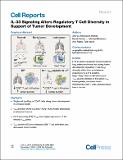| dc.contributor.author | Li, Amy | |
| dc.contributor.author | Herbst, Rebecca H. | |
| dc.contributor.author | Canner, David Allen | |
| dc.contributor.author | Schenkel, Jason | |
| dc.contributor.author | Smith, Olivia C. | |
| dc.contributor.author | Kim, Jonathan Y. | |
| dc.contributor.author | Hillman, Michelle | |
| dc.contributor.author | Bhutkar, Arjun | |
| dc.contributor.author | Cuoco, Michael S. | |
| dc.contributor.author | Rappazzo, C. Garrett | |
| dc.contributor.author | Rogers, Patricia | |
| dc.contributor.author | Dang, Celeste | |
| dc.contributor.author | Jerby-Arnon, Livnat | |
| dc.contributor.author | Rozenblatt-Rosen, Orit | |
| dc.contributor.author | Cong, Le | |
| dc.contributor.author | Birnbaum, Michael E | |
| dc.contributor.author | Regev, Aviv | |
| dc.contributor.author | Jacks, Tyler E | |
| dc.date.accessioned | 2020-06-26T20:09:45Z | |
| dc.date.available | 2020-06-26T20:09:45Z | |
| dc.date.issued | 2019-12 | |
| dc.date.submitted | 2019-09 | |
| dc.identifier.issn | 2211-1247 | |
| dc.identifier.uri | https://hdl.handle.net/1721.1/126003 | |
| dc.description.abstract | Regulatory T cells (Tregs) can impair anti-tumor immune responses and are associated with poor prognosis in multiple cancer types. Tregs in human tumors span diverse transcriptional states distinct from those of peripheral Tregs, but their contribution to tumor development remains unknown. Here, we use single-cell RNA sequencing (RNA-seq) to longitudinally profile dynamic shifts in the distribution of Tregs in a genetically engineered mouse model of lung adenocarcinoma. In this model, interferon-responsive Tregs are more prevalent early in tumor development, whereas a specialized effector phenotype characterized by enhanced expression of the interleukin-33 receptor ST2 is predominant in advanced disease. Treg-specific deletion of ST2 alters the evolution of effector Treg diversity, increases infiltration of CD8+ T cells into tumors, and decreases tumor burden. Our study shows that ST2 plays a critical role in Treg-mediated immunosuppression in cancer, highlighting potential paths for therapeutic intervention. | en_US |
| dc.language.iso | en | |
| dc.publisher | Elsevier BV | en_US |
| dc.relation.isversionof | http://dx.doi.org/10.1016/j.celrep.2019.10.120 | en_US |
| dc.rights | Creative Commons Attribution 4.0 International license | en_US |
| dc.rights.uri | https://creativecommons.org/licenses/by/4.0/ | en_US |
| dc.source | Elsevier | en_US |
| dc.title | IL-33 Signaling Alters Regulatory T Cell Diversity in Support of Tumor Development | en_US |
| dc.type | Article | en_US |
| dc.identifier.citation | Li, Amy et al. "IL-33 Signaling Alters Regulatory T Cell Diversity in Support of Tumor Development." Cell Reports 29, 10 (December 2019): P2998-3008.e8 © 2019 The Author(s) | en_US |
| dc.contributor.department | Massachusetts Institute of Technology. Department of Biology | en_US |
| dc.contributor.department | Koch Institute for Integrative Cancer Research at MIT | en_US |
| dc.relation.journal | Cell Reports | en_US |
| dc.eprint.version | Final published version | en_US |
| dc.type.uri | http://purl.org/eprint/type/JournalArticle | en_US |
| eprint.status | http://purl.org/eprint/status/PeerReviewed | en_US |
| dc.date.updated | 2019-12-10T18:34:10Z | |
| dspace.date.submission | 2019-12-10T18:34:12Z | |
| mit.journal.volume | 29 | en_US |
| mit.journal.issue | 10 | en_US |
| mit.metadata.status | Complete | |
